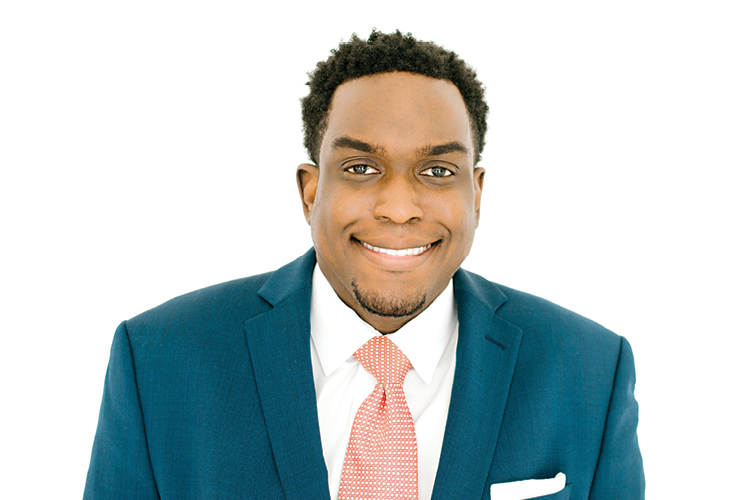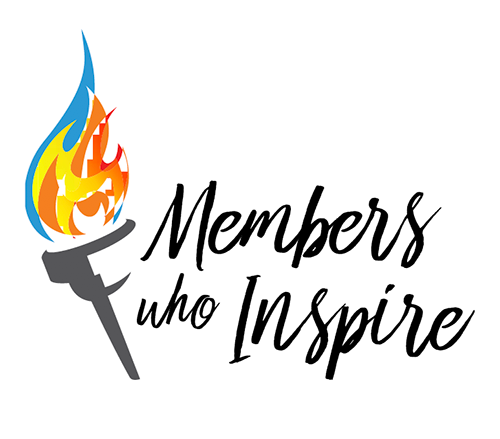Aubrey Coleman is helping bring communities access to high-speed internet and other infrastructure

Photo of Aubrey Coleman by MG Photography
When Aubrey Coleman was working for T-Mobile as a siting advocacy manager, he developed a public policy program to help expand emerging wireless technologies across the Southern United States.
He discussed the program with civic leaders and residents at public meetings, where he often heard that marginalized communities were left behind when it came to broadband, or high-speed internet access. He realized it was a critical issue and decided to do something about it.
“I found myself spending my free time after work serving on advisory committees and panels and work groups and sometimes with just a group of do-gooders, trying to figure out: ‘How can we advocate to expand broadband?’” says Coleman, who lives and works in the Dallas area. “Nobody was really thinking about it at the time until COVID hit, and then that’s all anybody wanted to talk about. I wanted the opportunity to go deeper and do more.”
Coleman found that opportunity with the Microsoft Airband Initiative, which advances access to affordable internet, devices and digital skills training around the world. The initiative estimates that more than one in three people in the United States aren’t using the internet at broadband speeds as defined by the Federal Communications Commission.
In January 2021, he became a program manager and began working with internet service providers to bring affordable broadband to people living in unserved rural areas across the country. He also partners with community organizations to educate residents on how to obtain federal subsidies to reduce the price of internet access; how to safely navigate the internet; and how to access computers or tablets at lower prices.
Coleman added another dimension to his work in June 2021, when Microsoft announced it would expand its Airband Initiative to Atlanta, Los Angeles and other U.S. cities with significant broadband gaps among racial and ethnic minorities, specifically Black communities. He has since led engagement and policy efforts for this program, which is a part of Microsoft’s broader Racial Equity Initiative.

In recent months, Coleman has helped farmers in Indiana, Texas and other states adopt technology that uses broadband to track cattle movement, crop growth and soil health. He also visited Black church leaders in Chicago who want to share the message about low-cost broadband and devices with their congregations. His wife, Elizabeth, has family from Nigeria, so he also began identifying internet service providers that could bring affordable broadband to unserved rural locations throughout Africa. In December, Microsoft announced plans to partner with local and global providers to expand its Airband Initiative to bring internet access to 100 million people in Africa by the end of 2025.
“Our group always says that we view broadband as a fundamental right, meaning broadband should be just as imperative for people to have as electricity or as running water,” says Coleman, who also helps draft legislation to expand high-speed internet. “That’s the way the world is moving. Broadband can be an accelerant, or it can be a dividing line if infrastructure is not being deployed in an equitable fashion.”
‘Voice to the voiceless’
As a kid, Coleman attended the Sixth Avenue Baptist Church in Birmingham, Alabama, where the Rev. Martin Luther King Jr. and other leaders preached during the civil rights movement. He felt connected to these leaders, whose stories instilled in him a sense of duty to advocate for members of marginalized communities.
“Giving a voice to the voiceless—that was just so embedded in who I was as a child, and I think it’s what inspired the path that I’m on today,” Coleman says.
By the time he attended the University of Alabama, Coleman had developed an interest not only in law but in financial markets. He studied corporate finance and economics with a concentration in public policy and macroeconomic monetary policy and graduated in 2010.
While in college, Coleman started an initiative called Stepping Stones, through which he helped bring middle school students from impoverished areas to campus and introduced them to business, engineering and other fields. He began thinking about disparities in education and how they are connected to students’ lack of access to computers and other vital infrastructure.
“I thought, ‘Education may not be my path, but what about infrastructure?’” says Coleman, adding that not many people focused on how investments could kick-start economic development, particularly in underserved communities in the South. “I also felt there weren’t enough people who understood the social need and could take technical engineering infrastructure discussions and translate all of this into actionable policy and drive change. I mentioned this to the associate dean of the law school, who responded with, ‘Why don’t you become that person?’”
Coleman graduated from the University of Alabama’s joint law and master’s in civil engineering program in 2014. He started at Alaska Airlines in Seattle, where he was the manager of airport affairs and airport real estate. After he got engaged to Elizabeth, a fellow attorney he met while in law school, he moved to Houston.
He worked as an associate attorney at tax consulting firm Alliantgroup for about a year before joining T-Mobile in Dallas in 2017.
Ebele Okoli, the senior accessibility program manager at Microsoft, who now works closely with Coleman, calls him “a convener of people.”
“Another thing that’s very intriguing about Aubrey is the way he does his work,” Okoli adds. “He sits down and really listens to what you’re talking about, and he internalizes it. I’m in accessibility. That’s not a space he was familiar with, but once he took the time to learn this is why digital accessibility matters, you could see him creating strategies that are now inclusive of disability. That is not typical for a lot of people.”
Community-minded
Coleman has found other ways to build up his community.
“You watch the news, and you see there is so much need,” Coleman says. “You also see groups of people trying to lift others up and see they need more support. It’s hard to sit back and watch, knowing you’ve been blessed with a skill set that could create better change for more people.”
He wanted to help improve voting access after witnessing a man struggle to cast a ballot at his polling place during the 2018 election.
He became a voter protection attorney with the Texas Democratic Party, where he volunteers for its voter assistance hotline. He also serves on the advisory board for the nonpartisan This is Project Texas, which advances statewide voter education and access.
In 2019, Coleman began working with Feed Oak Cliff, a Dallas group that aims to eliminate food insecurity and establish a community-run gro- cery store in the southern part of the city. He serves on its board of direc- tors, handling legal work and helping raise funds and develop a model that could be replicated around the country.
“I learned quickly that Aubrey really has a heart for the community,” says Anga Sanders, the founder and executive director of Feed Oak Cliff. “He had a job that kept him busy all the time, and he has another job now that keeps him even busier, but he has never lost his passion for this project.”
Coleman is also the immediate past chair of the ABA Section of State and Local Government Law Telecommunications & Land Use Subcommittee. He now serves as vice-chair of the Young Lawyers Division’s civic engagement team.
In 2020, Coleman received the Section of State and Local Government Law’s Jefferson B. Fordham Award in the Up & Comers category. He also received a Young Lawyers Division’s On the Rise Award in 2022. He considers encouraging other young lawyers to pursue their true interests among his accomplishments.
“My career has allowed me to chase my passion, but I’ve been able to do it in a way that also allows me to take care of my family and contribute to the community,” says Coleman, whose twins were born in July. “By working with younger attorneys, I like to use my story and the story of my peers who are doing a lot of other really cool things to get people to think a little differently and lean into their passion.”
This story was originally published in the February-March 2023 issue of the ABA Journal under the headline: “Building a Bridge: Aubrey Coleman helps communities access high-speed internet and other infrastructure.”
Members Who Inspire is an ABA Journal series profiling exceptional ABA members. If you know members who do unique and important work, you can nominate them for this series by emailing [email protected].



